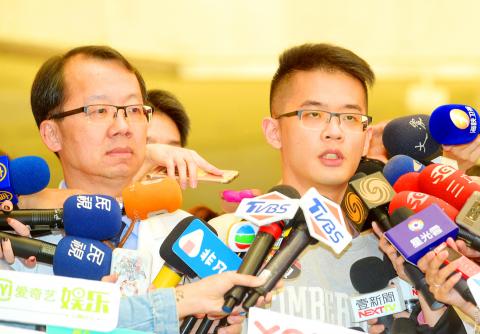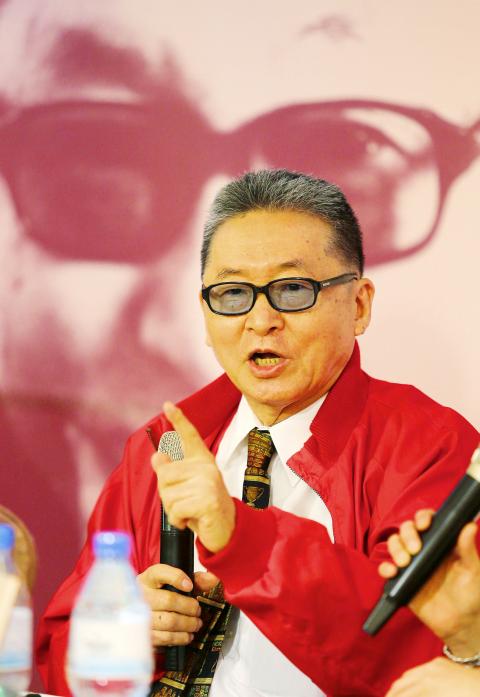Author, politician and historian Li Ao (李敖) yesterday passed away peacefully after a battle with brain cancer, Taipei Veterans General Hospital said.
Li was 83 years old.
He had sought treatment at the hospital in July 2015, saying he had an unsteady gait, and was later diagnosed with brainstem gliomas.

Photo: Chang Chia-ming, Taipei Times
His condition had stabilized after initial treatment, but he was readmitted to hospital several times last year.
In October last year, he was hospitalized for pneumonia, but a subsequent magnetic resonance imaging brain scan showed that his tumors had worsened.
Li began receiving targeted therapy in November and his condition improved.

Photo: CNA
However, the therapy started to lose effect in January and his overall condition began to deteriorate, the hospital said.
His son, Li Kan (李戡), yesterday said his father had remained strong and resilient during his illness, adding that he discussed his disease with medical personnel jokingly.
Li Ao’s family would make his funeral as simple as possible and does not plan to hold any public remembrance activities, Li Kan said.
As a versatile writer with a piercing and critical style, Li Ao was best known for his studies on history, in addition to his political commentaries, biographies and literary works.
During the Chinese Nationalist Party’s (KMT) authoritarian regime, he was regarded as an intellectual heretic who fought for freedom of speech and publication.
His 96 works were banned by the KMT during the Martial Law period.
“Li Ao epitomizes a wish, an action, a symbol of rebellion for people in that era,” said Chen Fang-ming (陳芳明), a professor at National Chengchi University’s Graduate Institute of Taiwanese Literature.
“The era’s intellectuals were eager to watch his performance, but none dared to join his company,” Chen said. “He was more critical and radical than any self-esteemed leftists.”
“Without Li Ao, Taiwan under [the KMT’s] authoritarian regime might have had a harder time,” he added.
Li Ao worked for a while in real estate, served as editor-in-chief of Wen Hsing (文星) magazine, founded a publishing house named after himself, was a TV host and taught history at Soochow University.
He ran for president in the 2000 election on the New Party ticket, and was elected as a lawmaker in 2004.
Li Ao is a legend among his contemporaries, former legislative speaker Wang Jin-pyng (王金平) said yesterday, adding that he had “lost a good friend.”
Democratic Progressive Party caucus whip Ker Chien-ming (柯建銘) said he admired Li Ao’s polished, critical and solid writing, and that he inspired rebellious movements against the government.
People First Party caucus whip Lee Hung-chun (李鴻鈞) expressed his sorrow over Li Ao’s death.
The Executive Yuan offered its condolences to Li Ao’s family.
Executive Yuan spokesman Hsu Kuo-yung (徐國勇) said he and Premier William Lai (賴清德) served at the Legislative Yuan with Li Ao in 2004, and expressed sadness over his death.

SECURITY: As China is ‘reshaping’ Hong Kong’s population, Taiwan must raise the eligibility threshold for applications from Hong Kongers, Chiu Chui-cheng said When Hong Kong and Macau citizens apply for residency in Taiwan, it would be under a new category that includes a “national security observation period,” Mainland Affairs Council (MAC) Minister Chiu Chui-cheng (邱垂正) said yesterday. President William Lai (賴清德) on March 13 announced 17 strategies to counter China’s aggression toward Taiwan, including incorporating national security considerations into the review process for residency applications from Hong Kong and Macau citizens. The situation in Hong Kong is constantly changing, Chiu said to media yesterday on the sidelines of the Taipei Technology Run hosted by the Taipei Neihu Technology Park Development Association. With

CARROT AND STICK: While unrelenting in its military threats, China attracted nearly 40,000 Taiwanese to over 400 business events last year Nearly 40,000 Taiwanese last year joined industry events in China, such as conferences and trade fairs, supported by the Chinese government, a study showed yesterday, as Beijing ramps up a charm offensive toward Taipei alongside military pressure. China has long taken a carrot-and-stick approach to Taiwan, threatening it with the prospect of military action while reaching out to those it believes are amenable to Beijing’s point of view. Taiwanese security officials are wary of what they see as Beijing’s influence campaigns to sway public opinion after Taipei and Beijing gradually resumed travel links halted by the COVID-19 pandemic, but the scale of

A US Marine Corps regiment equipped with Naval Strike Missiles (NSM) is set to participate in the upcoming Balikatan 25 exercise in the Luzon Strait, marking the system’s first-ever deployment in the Philippines. US and Philippine officials have separately confirmed that the Navy Marine Expeditionary Ship Interdiction System (NMESIS) — the mobile launch platform for the Naval Strike Missile — would take part in the joint exercise. The missiles are being deployed to “a strategic first island chain chokepoint” in the waters between Taiwan proper and the Philippines, US-based Naval News reported. “The Luzon Strait and Bashi Channel represent a critical access

Pope Francis is be laid to rest on Saturday after lying in state for three days in St Peter’s Basilica, where the faithful are expected to flock to pay their respects to history’s first Latin American pontiff. The cardinals met yesterday in the Vatican’s synod hall to chart the next steps before a conclave begins to choose Francis’ successor, as condolences poured in from around the world. According to current norms, the conclave must begin between May 5 and 10. The cardinals set the funeral for Saturday at 10am in St Peter’s Square, to be celebrated by the dean of the College